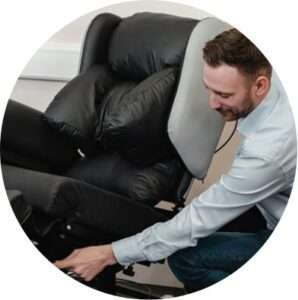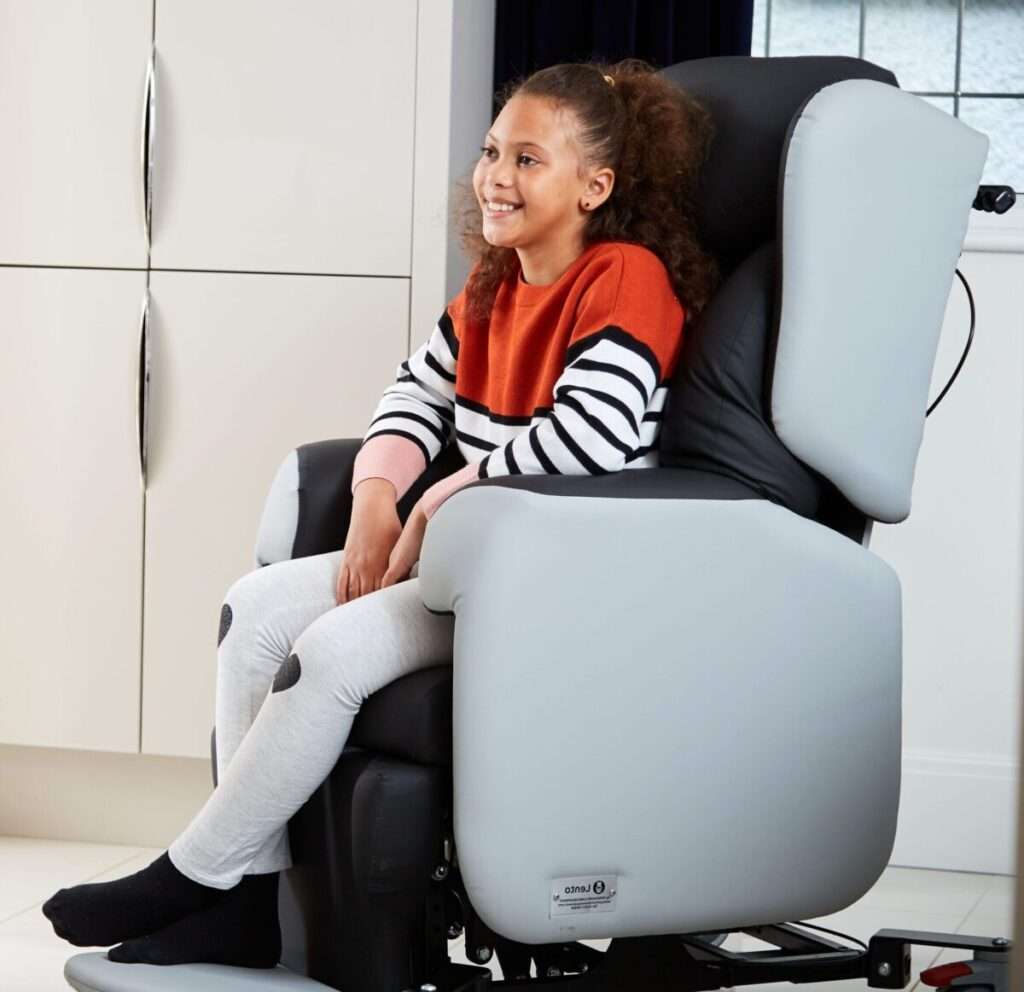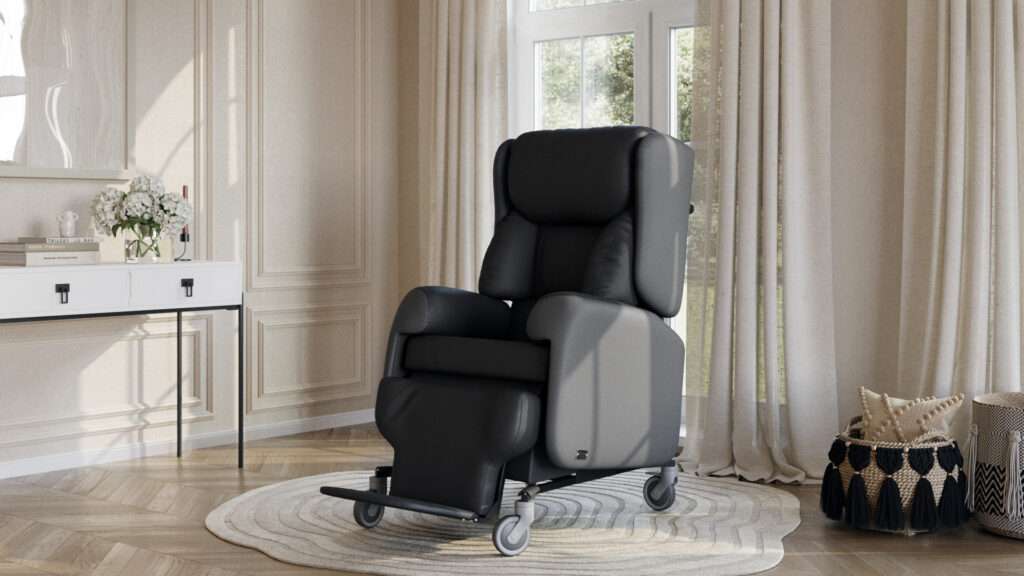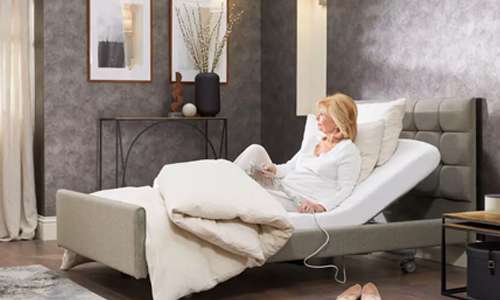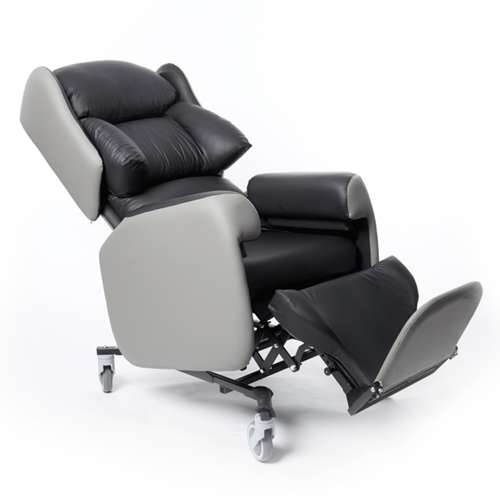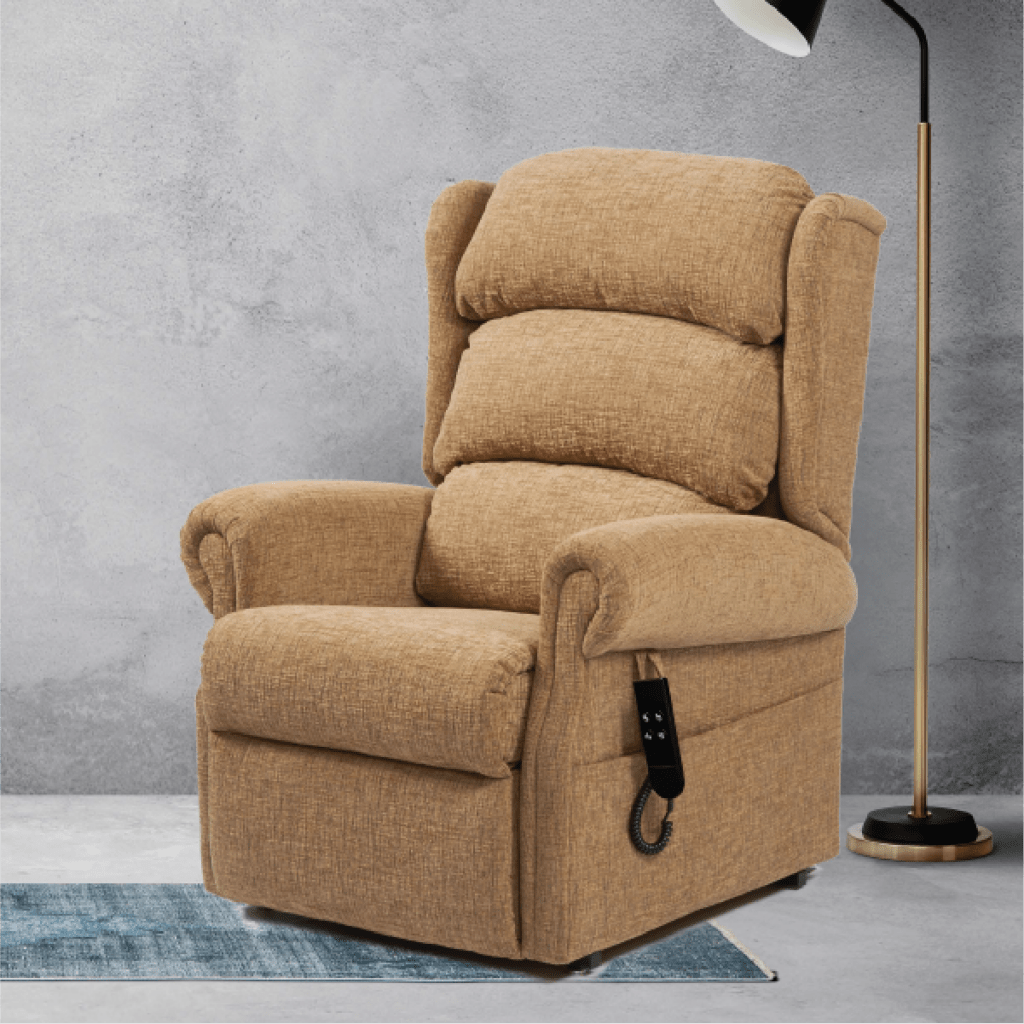Specialist seating plays a vital role in supporting people with complex medical and postural needs, but accessing funding can be financially and emotionally overwhelming. Whether you’re a patient, family member or carer, this guide explains the funding options available and how to get started.
Jump straight to...
What Is Specialist Seating?
Specialist seating is designed to provide tailored postural support, comfort and safety, and includes tilt-in-space chairs, postural management systems, custom-moulded seating, and specialist riser recliner chairs.
These seating solutions are often essential for individuals with conditions like cerebral palsy, muscular dystrophy, spinal injuries, or neurological disorders.
How Much Does Specialist Seating Cost?
The cost of specialist seating varies depending on the level of support, features, and customisation included.
Manual recliners can cost from £500/£600 upwards, whereas electric and bespoke rise and recliner chairs are more in the region of £1,000–£2,000+.
If you need more specialist seating for greater postural support, care chairs are more expensive from £1,100–£4,000, and powerchairs for outdoor access can be anything from £3,000+.
These costs don’t include assessments, delivery, accessories, or repairs, making funding support even more essential.
Funding Options for Patients and Families
There are different avenues of funding depending on your circumstances and level of need; in this guide we can help direct you to the funding sources most relevant to you.
Chair Hire Options
If you only need specialist seating for a short-term rehabilitation period or trial use, chair hire can be a flexible and cost-effective solution. Vivid Care offers a wide range of specialist seating available for hire, including riser recliners, postural chairs, and bariatric seating options.
This can be ideal for:
- Temporary post-surgery support
- Palliative or end-of-life care
- Trial periods before committing to a full purchase
Visit our hire section to explore our Chair Hire options.
Finance Options
If you are looking to spread the cost of your purchase, we also offer flexible finance options to make specialist seating more affordable.
Learn more about our range of finance options such as long-term rental, hire purchase and leasing.
NHS Wheelchair Services
If the seating is medically necessary, your local NHS wheelchair and seating service may provide equipment on loan.
You can request a referral through your GP, occupational therapist, or physiotherapist, and attend an assessment to determine your clinical needs.
Provision depends on your local Integrated Care Board (ICB) and availability. Seating may be more basic than privately available options.
Local Authority Support
If the equipment helps with daily care, education, or social inclusion, your local council may help through:
- Children’s Services (under 18): Request a Child in Need Assessment
- Adult Social Care: Ask for a Care Needs Assessment under the Care Act 2014
You may be offered a Personal Budget or Direct Payments to purchase the equipment yourself.
Charities & Non-Profit Funding
Several UK charities offer grants for specialist seating. These include:
| Charity | Eligibility | Apply |
| Newlife Charity | Children with disabilities | newlifecharity.co.uk |
| Family Fund | Low-income families with disabled children | familyfund.org.uk |
| Boparan Charitable Trust | Children with medical/disability needs | theboparancharitabletrust.com |
| Variety – The Children’s Charity | Children aged 0–18 | variety.org.uk |
| Caudwell Children | Equipment & therapy for children | caudwellchildren.com |
| Elifar Foundation | Young people with severe disabilities | elifarfoundation.org.uk |
Tips for your application:
- Include your OT or Physio report
- Provide a quote from a specialist seating provider
- Describe how it will impact your quality of life
For a list of charities and grant providers, download our Vivid Care Charities Database.
Private Medical Insurance
Some private healthcare plans cover specialist equipment under ‘mobility aids’ or ‘durable medical equipment’.
If you have private medical insurance, check your policy for the following:
- Is equipment covered under your policy?
- Do you need a referral or prescription?
- What’s the claim and reimbursement process?
Crowdfunding & Community Support
When funding isn’t available elsewhere, crowdfunding can be a lifeline. Popular platforms include GoFundMe, JustGiving and Crowdfunder UK.
Top crowdfunding tips:
- Tell your personal story and show how seating will help
- Include photos, quotes, and regular updates
- Share via local schools, churches, and community groups
Second-Hand Seating: Is It Safe?
Buying pre-owned specialist seating can save money, but professional guidance is essential before committing yourself to purchase. Places to look for second-hand seating include:
- Disabled Equipment Services
- Mobility Market UK
- Facebook support groups
- Second-hand selling sites such as eBay or Gumtree
Always consult your OT or seating specialist before using second-hand seating to ensure correct fit and postural support.
Practical Tips for Families When Applying For Funding
Keep records: Store quotes, medical reports, and application copies
Ask for support: Healthcare professionals can help write funding letters
Be persistent: Many grants take weeks – chase politely and regularly
Explore all routes: Most families combine several sources of funding
Funding Options for Community Care Organisations
Care homes and social care providers need the right resources at their disposal to deliver the best standards of care. Getting the financial support they need is an essential part of this process, here are some funding sources for community care organisations.
NHS Continuing Healthcare (CHC)
Specific care packages can be requested for adults in the community with long-term needs. Social care is arranged and funded solely by the NHS. There is a separate framework in place for children and young people.
Check the eligibility criteria to see if any patients under your care are eligible for this funding.
Integrated Care Partnerships
Local health and care organisations have partnered together to deliver care and support to where it is most needed within the community. The success of this is recounted in the NHS publication “Going further for winter: Community-based falls response”.
Contact your local Integrated Care Service to discuss how a collaboration in your area can mutually benefit all involved.
Conclusion
Finding the right seating can be a complex journey, but you don’t have to do it alone. At Vivid Care, we work closely with families, therapists, and funding partners to provide the right equipment and advice.
Many organisations that provide funding require a supplier quote as part of your application – contact us for a no-obligation quote today!
Frequently Asked Questions (FAQ)
Can I apply for more than one funding source at the same time?
Yes, many families combine several funding sources such as NHS provision, local authority support, and charitable grants to meet their needs.
How long does it take to get funding approved?
It varies, NHS and local authority assessments can take weeks to months. Charitable grants may take several weeks depending on the organisation. Be sure to follow up regularly and keep records of your communications.
Is second-hand specialist seating a good option?
It can be, but only with professional advice. Always consult your OT or a seating specialist to ensure the seating is safe, appropriate, and supportive for your specific needs.
Do private insurers cover specialist seating?
Some do, under mobility or durable medical equipment clauses. Contact your insurer directly to check your policy’s coverage and claim process.



